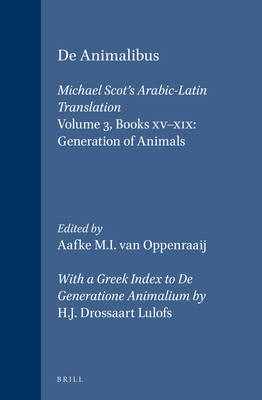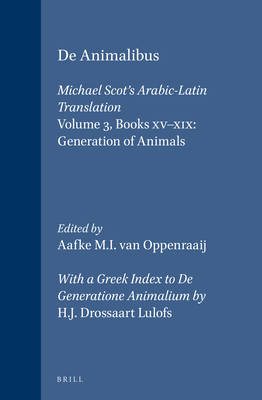
- Afhalen na 1 uur in een winkel met voorraad
- Gratis thuislevering in België vanaf € 30
- Ruim aanbod met 7 miljoen producten
- Afhalen na 1 uur in een winkel met voorraad
- Gratis thuislevering in België vanaf € 30
- Ruim aanbod met 7 miljoen producten
Zoeken
de Animalibus. Michael Scot's Arabic-Latin Translation, Volume 3 Books XV-XIX: Generation of Animals
With a Greek Index to de Generatione Animalium by H.J. Drossaart Lulofs
€ 633,45
+ 1266 punten
Omschrijving
Aristotle's De Animalibus was an important source of zoological knowledge both for the ancient Greeks and for the medieval Arabs and Europeans. The work was twice translated into Latin, once directly from the Greek by William of Moerbeke and once, by way of the intermediary of an existing Arabic translation, by Michael Scot. Of these, Scot's translation is the oldest.
The De Animalibus is composed of three sections: 'History of Animals' (10 books), 'Parts of Animals' (4 books) and 'Generation of Animals' (5 books). The present volume contains the first critical edition of Scot's translation of the last section. Editions of his translations of the two preceding sections are in preparation.
The volume includes very complete Latin-Arabic and Arabic-Latin word indexes and, as a supplement, the first complete word index to the original Greek text of 'Generation of Animals'.
The volume for the first time makes available to the scholarly world a version of Aristotle's 'Generation of Animals' that has long been one of the main sources of knowledge in Europe on the subject. Being a faithful translation of a translation produced by a Syriac-speaking Christian, the text also contributes to our knowledge of Middle Arabic.
The De Animalibus is composed of three sections: 'History of Animals' (10 books), 'Parts of Animals' (4 books) and 'Generation of Animals' (5 books). The present volume contains the first critical edition of Scot's translation of the last section. Editions of his translations of the two preceding sections are in preparation.
The volume includes very complete Latin-Arabic and Arabic-Latin word indexes and, as a supplement, the first complete word index to the original Greek text of 'Generation of Animals'.
The volume for the first time makes available to the scholarly world a version of Aristotle's 'Generation of Animals' that has long been one of the main sources of knowledge in Europe on the subject. Being a faithful translation of a translation produced by a Syriac-speaking Christian, the text also contributes to our knowledge of Middle Arabic.
Specificaties
Betrokkenen
- Uitgeverij:
Inhoud
- Aantal bladzijden:
- 534
- Taal:
- Engels
- Reeks:
- Reeksnummer:
- nr. 5
Eigenschappen
- Productcode (EAN):
- 9789004096035
- Verschijningsdatum:
- 1/04/1992
- Uitvoering:
- Hardcover
- Formaat:
- Genaaid
- Afmetingen:
- 155 mm x 235 mm
- Gewicht:
- 953 g

Alleen bij Standaard Boekhandel
+ 1266 punten op je klantenkaart van Standaard Boekhandel
Beoordelingen
We publiceren alleen reviews die voldoen aan de voorwaarden voor reviews. Bekijk onze voorwaarden voor reviews.







